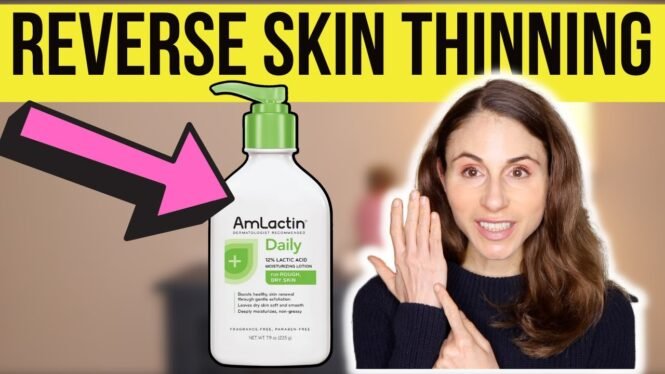If you’re reading this post, you may be experiencing skin thinning and seeking expert advice to help reverse the condition. Look no further than renowned dermatologist @DrDrayzday, who has shared valuable insights and practical tips on how to address this common skin concern. In this article, you’ll discover a wealth of information from Dr. Dray as she shares her knowledge on how to reverse skin thinning and achieve healthy, vibrant skin. So, let’s dive in!
How to Reverse Skin Thinning: Tips and Tricks from a Dermatologist
Skin thinning is a natural part of aging, but it can also be caused by a variety of factors such as excessive sun exposure, smoking, and even the use of topical steroids. While we cannot completely stop the aging process, there are steps we can take to slow down skin thinning and even reverse it.
In this article, we’ll discuss tips and tricks from dermatologist @DrDrayzday on how to reverse skin thinning, prevent skin atrophy, and promote healthy skin:
1. Introduction
As we age, the skin loses collagen and elastin, two proteins that keep the skin firm and supple. The skin also becomes thinner and more fragile, making it more susceptible to tears, bruises, and other injuries. However, there are ways to slow down this process and even reverse some of the damage that has been done.
2. Can Skin Thinning from Topical Steroids Be Reversed?
Topical steroids are commonly used to treat a variety of skin conditions, but prolonged use can lead to skin thinning and atrophy. According to @DrDrayzday, skin thinning from topical steroids can be reversed, but it takes time and patience. It’s important to work with your healthcare provider to gradually taper off the use of steroids and switch to alternative treatments.
3. Tips on How to Treat Thin Skin That Tears Easily
If you have thin skin that tears easily, there are several things you can do to protect your skin and promote healing. These include:
- Moisturizing regularly with a thick, fragrance-free cream or ointment.
- Using a gentle cleanser and avoiding hot water.
- Wearing protective clothing when outdoors, including hats and long sleeves.
- Applying sunscreen with a broad-spectrum SPF of 30 or higher to protect your skin from further damage.
- Avoiding irritants and allergens that can exacerbate skin thinning.
4. Tips on How to Treat Thin Skin on the Arms That Bruises Easily
If you have thin skin on your arms that bruises easily, there are several things you can do to minimize bruising and promote healing. These include:
- Applying a cold compress to the bruised area for 20-30 minutes at a time, several times a day.
- Elevating the affected area to reduce swelling and inflammation.
- Avoiding medications and supplements that can increase the risk of bruising, such as aspirin and blood thinners.
- Consuming foods rich in vitamin C, which can help strengthen blood vessels and reduce the risk of bruising.
5. The Best Foods for Collagen
Collagen is a protein that plays a crucial role in keeping the skin firm, elastic, and youthful-looking. Some of the best foods for collagen include:
- Bone broth
- Fish
- Poultry
- Egg whites
- Berries
- Citrus fruits
- Leafy greens
- Nuts and seeds
6. The Worst Foods for Collagen
On the other hand, there are certain foods that can damage collagen and accelerate skin aging. These include:
- Processed foods high in sugar and refined carbohydrates.
- Red meat, especially when cooked at high temperatures.
- Fried foods.
- Alcohol and caffeine.
7. A Recommendation for Amlactin to Prevent Skin Thinning
Amlactin is a moisturizing lotion that contains alpha-hydroxy acids (AHAs), which can help exfoliate the skin and promote collagen production. According to @DrDrayzday, using Amlactin regularly can help prevent skin thinning and promote healthy skin.
8. Amazon and LTK Shop Recommendations
@DrDrayzday recommends several products available on Amazon and LTK to help reverse skin thinning and promote healthy skin, including:
- Retinoids, such as Differin Gel and RoC Retinol Correxion Cream
- Hyaluronic acid serums, such as The Ordinary Hyaluronic Acid 2% + B5
- Lactic acid lotions, such as AmLactin Moisturizing Lotion
- Growth factor serums, such as SkinMedica TNS Essential Serum
- DHEA cream, such as Life-Flo DHEA Plus Cream
9. Social Media Profiles of the Dermatologist
You can follow @DrDrayzday on Instagram, YouTube, and TikTok for more skincare tips and tricks.
10. References Cited for Further Reading
@DrDrayzday cites several studies throughout the video for further reading and to support her recommendations, including:
- Skin Aging Handbook: An Integrated Approach to Biochemistry and Product Development by Nava Dayan
- Skin Barrier Function by Peter M. Elias and Kenneth R. Feingold
- The Role of Nutrition in the Development of Aging Phenomena by Agnieszka Błaszczyk, Magdalena Augustyniak, and Danuta Skopinska-Wisniewska
11. Importance of Diet and DHEA Supplements for Skin Thinning
@DrDrayzday emphasizes the importance of a healthy diet and supplements to promote skin health. In particular, she recommends DHEA supplements, which can help boost collagen production and improve skin elasticity.
12. Hormone Replacement Therapy (HRT) for Skin Thinning
Hormone replacement therapy (HRT) may be an option for postmenopausal women who are experiencing skin thinning and other symptoms of hormonal imbalance. However, it’s important to discuss the risks and benefits of HRT with your healthcare provider before starting treatment.
13. Conclusion
Skin thinning is a natural part of aging, but there are steps we can take to slow down the process and even reverse some of the damage that has been done. By following the tips and recommendations of @DrDrayzday, we can promote healthy, youthful-looking skin and feel confident in our own skin.
14. FAQs
- Can wrinkles be reversed?
- Is it possible to tighten loose skin without surgery?
- How can I increase collagen in my skin?
- What foods should I avoid to prevent skin aging?
- Can topical creams really reverse skin thinning?

